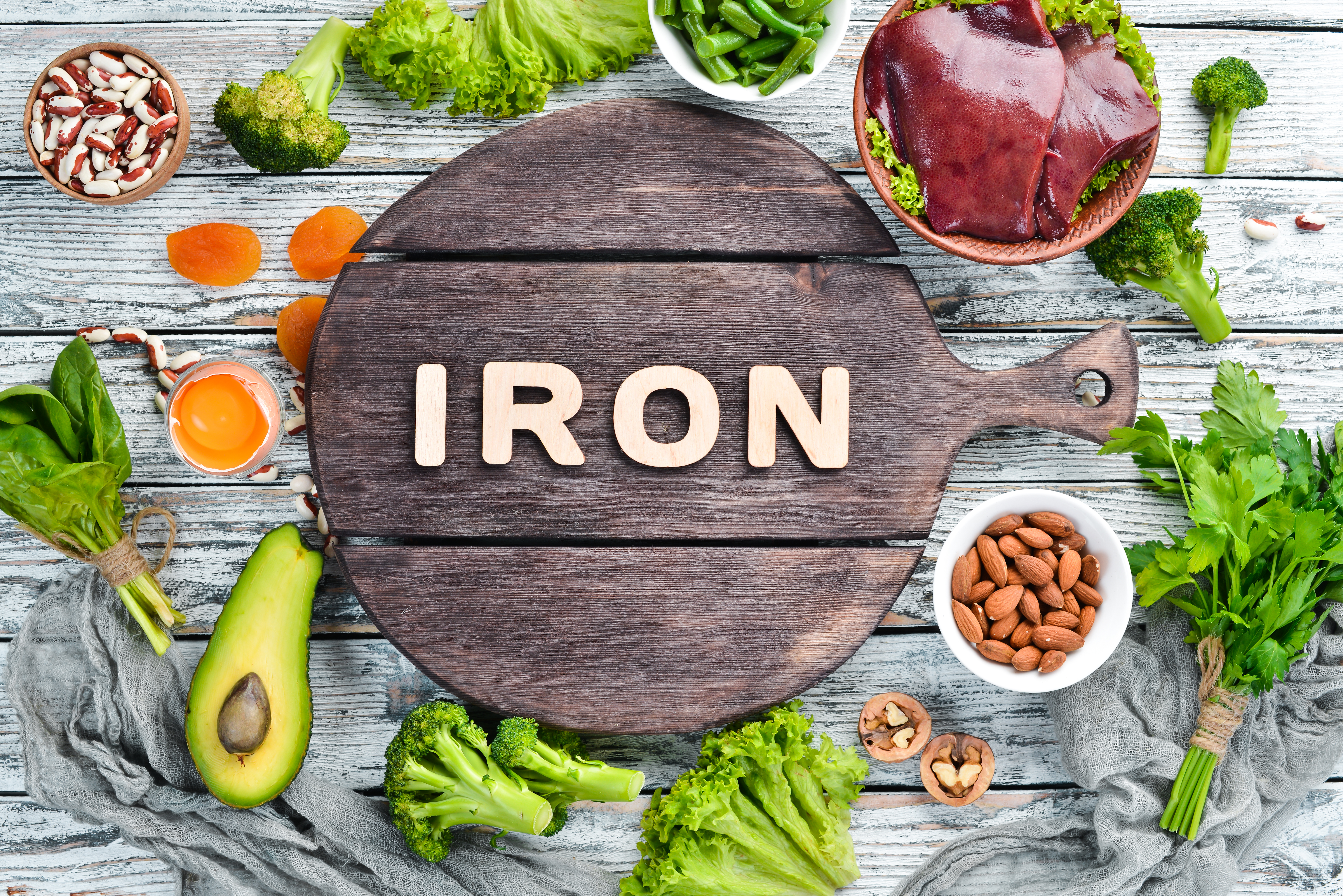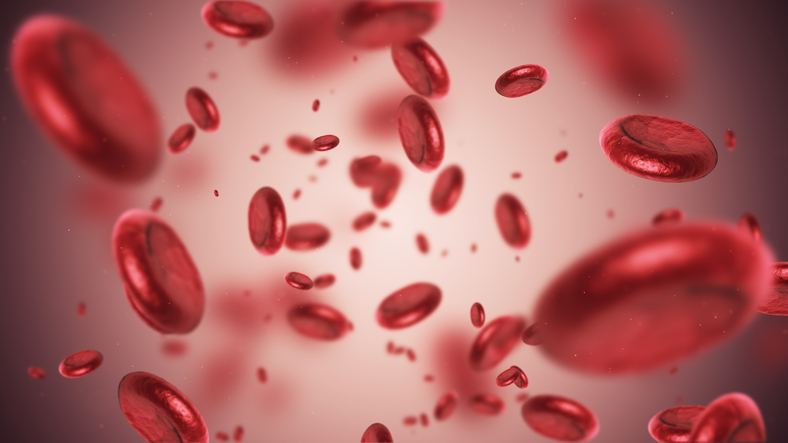Iron deficiencies: Facts and myths about your iron
Iron is an essential mineral that our body needs to produce red blood cells, which are formed in the bone marrow (the soft spongy tissue found in the middle of our bones). Iron helps make haemoglobin, a protein that carries oxygen in the blood so all our cells can work properly.
As our body can’t make iron, we need to obtain it through our diet. Our liver has small reserves of iron that our body can use if required, but once these reserves are depleted, our body will be unable to make haemoglobin which forms part of our red blood cells.
Forms of iron
There are two forms of iron that comes from food.
Heme: This form is found only in animal foods and it is better absorbed by the body than non-heme iron. Good sources include red meat, poultry, seafood.
Non-heme: This form of iron is found in plant foods such as wholegrains, nuts, seeds, legumes and leafy greens. It is also found in animal foods as animals consume plant foods.

What’s next?
Should you require the addition of vitamins or supplements to your diet, you can shop a full range of supplements here.
What is iron deficiency?
Iron deficiency occurs when we don’t have enough iron in our body. If we don’t eat as much iron as we use when we make red blood cells, we can become deficient. Low levels of iron can also lead to a condition called anemia, which is a deficiency in the number of red blood cells in our body.
Iron deficiency and anemia are quite common in Australia with more than 1 million people affected by it. Women experience it more than men — around 15% aged 18-30 and almost 14% aged 30-39 have iron deficiency.
What are the symptoms of iron deficiency?
If you have iron deficiency, you probably won’t notice straight away. As your body becomes more deficient, signs and symptoms become more noticeable, and may include:
- feeling tired
- pale skin
- cold feet and hands
- feeling breathless, even when not overly exerting yourself
- dizziness or feeling light-headed
- rapid or irregular heartbeat
- frequent headaches
- lack of concentration
- irritability or poor mood
- strange food cravings
- loss of appetite
- red or cracked tongue
- reduced sex drive
How do you know if you have an iron deficiency?
Iron deficiency is usually determined via a blood test that examines your iron levels and checks for anaemia.
What causes iron deficiency?
There are three main causes of iron deficiency:
- not getting enough iron in your diet
- an inability to absorb iron from your diet (known as malabsorption)
- losing blood (e.g. heavy periods, or internal bleeding due to stomach ulcers, polyps in the bowel, or bowel cancer)
Iron deficiency may also occur due to:
- periods of rapid growth (e.g. puberty and pregnancy)
- side effects of certain drugs and medications
- other medical conditions like autoimmune disorders, chronic disease, hormone disorders and bone marrow disease
Who is at risk of deficiency?
As we’ve already mentioned people who don’t eat animal products, or have nutrient absorption problems are at risk of a B12 deficiency. Others at risk include:
- The elderly — reduced levels of enzymes that break down protein, and reduced levels of stomach acid mean that B12 absorption is compromised in older people. According to Harvard University, up to 20 per cent of people over 50 may have a vitamin B12 deficiency.
- People who’ve had bowel surgery which removed the part that absorbs B12
- People taking certain diabetes medications
- Those taking long-term antacid drugs for heartburn.
Who is at risk of developing low iron?
Anyone can develop iron deficiency. However, some people are at higher risk. These include:
- people who don’t eat a balanced, healthy diet
- vegetarians or vegans who don’t eat animal products
- women who menstruate, especially if their periods are heavy
- people who donate blood regularly
- those going through rapid bodily changes (e.g. pregnant women or children going through puberty)
- people with conditions that involve internal bleeding such as Chrohn’s disease, ulcerative colitis, stomach ulcers or bowel cancer
- people with conditions that make it difficult to absorb nutrients (e.g. inflammatory bowel disease, coeliac disease)
- people who have bone marrow disorders, including leukemia
Can you prevent iron deficiency?
Most people can prevent becoming deficient in iron by eating a well-balanced diet that includes iron-rich foods. If you don’t eat meat, it may be helpful to seek the advice of a dietitian to ensure your diet is adequate.
If you have any health conditions that increase your risk of iron deficiency, it’s important you work with your doctor to manage and treat these.
How do you treat low iron
The first step in treating low iron is to determine if there is an underlying medical reason contributing to your deficiency. If there is, treatment will focus on addressing that condition first.
The next step is to get your iron levels back to a normal range. This will usually involve focusing on your diet and ensuring that you are eating iron-rich foods.
Your doctor may also recommend you increase your intake of vitamin C-rich foods, as this can help your body absorb iron. Treatment may also involve taking over-the-counter (OTC) iron supplements.
However, it’s important that you follow the directions outlined by your doctor, especially the dosage, as too much can be dangerous. For this reason, you should never self-diagnose iron deficiency or take supplements without the advice of your doctor.
If you are very low in iron or focusing on diet and supplementation aren’t enough, you may require an iron infusion. This involves iron being delivered to your body through a vein via a needle.
When should you see a doctor?
If you notice any of the signs and symptoms mentioned above, visit your doctor. While they may be a sign of iron deficiency, they may also be symptoms of another health condition that requires different treatment.
You should never try to self-diagnose and treat your symptoms on your own or take supplements without your doctor’s advice as this can lead to further health complications.

Disclaimer: General advice only – this information should not replace the information provided to you by your health care professional. If symptoms are severe or persist, please speak to your health care professional. You should also speak to your medical professional before taking any supplements, including herbal remedies.
References:
Medibank Better Health Index, More than 1 million Aussies iron deficient as data shows incidence increasing, https://www.medibank.com.au/livebetter/newsroom/post/more-than-1-million
Better Health Channel, Anaemia, https://www.betterhealth.vic.gov.au/health/conditionsandtreatments/anaemia
Better Health Channel, Anaemia, https://www.betterhealth.vic.gov.au/health/conditionsandtreatments/anaemia
Mayo Clinic, Anemia, https://www.mayoclinic.org/diseases-conditions/anemia/symptoms-causes/syc-20351360
Harvard School of Public Health, Iron, https://www.hsph.harvard.edu/nutritionsource/iron/
Healthdirect, Iron deficiency, https://www.healthdirect.gov.au/iron-deficiency
More health advice
View our wide range of health advice, tips and recommendations by visiting our health articles or checking out our top health articles below.
Vitamin D: A practical guide
One of the most important vitamins that our body needs to stay healthy is vitamin D. What’s even better is that it’s available for free from the sun!
Maintaining Healthy Bowel Habits
However, many people experience great difficulty passing a bowel motion and spend a lot of time sitting on the toilet with a very unsatisfactory result.
Understanding Constipation & Laxatives
The slower the food passes through the digestive tract, the more water will absorb into your colon. This results in less water in your stool.
